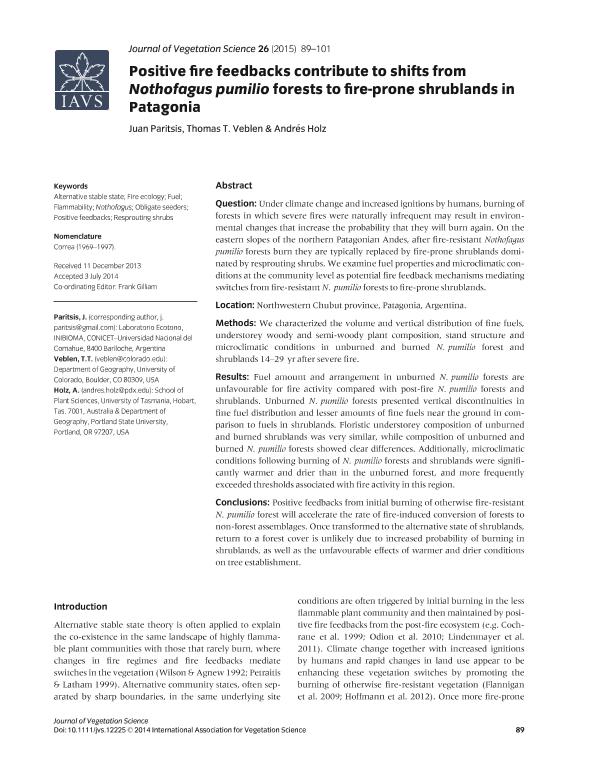Mostrar el registro sencillo del ítem
dc.contributor.author
Paritsis, Juan

dc.contributor.author
Veblen, Thomas T.
dc.contributor.author
Holz, Andrés
dc.date.available
2017-01-27T21:17:07Z
dc.date.issued
2015-01
dc.identifier.citation
Paritsis, Juan; Veblen, Thomas T.; Holz, Andrés; Positive fire feedbacks contribute to shifts from Nothofagus pumilio forests to fire-prone shrublands in Patagonia; Wiley Blackwell Publishing, Inc; Journal Of Vegetation Science; 26; 1; 1-2015; 89-101
dc.identifier.uri
http://hdl.handle.net/11336/12143
dc.description.abstract
Question: Under climate change and increased ignitions by humans, burning of forests in which severe fires were naturally infrequent may result in environmental changes that increase the probability that they will burn again. On the eastern slopes of the northern Patagonian Andes, after fire-resistant Nothofagus pumilio forests burn they are typically replaced by fire-prone shrublands dominated by resprouting shrubs. We examine fuel properties and microclimatic conditions at the community level as potential fire feedback mechanisms mediating switches from fire-resistant N. pumilio forests to fire-prone shrublands.
Location: Northwestern Chubut province, Patagonia, Argentina.
Methods: We characterized the volume and vertical distribution of fine fuels, understorey woody and semi-woody plant composition, stand structure and microclimatic conditions in unburned and burned N. pumilio forest and shrublands 14–29 yr after severe fire.
Results: Fuel amount and arrangement in unburned N. pumilio forests are unfavourable for fire activity compared with post-fire N. pumilio forests and shrublands. Unburned N. pumilio forests presented vertical discontinuities in fine fuel distribution and lesser amounts of fine fuels near the ground in comparison to fuels in shrublands. Floristic understorey composition of unburned and burned shrublands was very similar, while composition of unburned and burned N. pumilio forests showed clear differences. Additionally, microclimatic conditions following burning of N. pumilio forests and shrublands were signifi- cantly warmer and drier than in the unburned forest, and more frequently exceeded thresholds associated with fire activity in this region.
Conclusions: Positive feedbacks from initial burning of otherwise fire-resistant N. pumilio forest will accelerate the rate of fire-induced conversion of forests to non-forest assemblages. Once transformed to the alternative state of shrublands, return to a forest cover is unlikely due to increased probability of burning in shrublands, as well as the unfavourable effects of warmer and drier conditions on tree establishment.
dc.format
application/pdf
dc.language.iso
eng
dc.publisher
Wiley Blackwell Publishing, Inc

dc.rights
info:eu-repo/semantics/openAccess
dc.rights.uri
https://creativecommons.org/licenses/by-nc-sa/2.5/ar/
dc.subject
Estados Estables Alternativos
dc.subject
Ecologia del Fuego
dc.subject
Combustibles
dc.subject
Nothofagus
dc.subject.classification
Ecología

dc.subject.classification
Ciencias Biológicas

dc.subject.classification
CIENCIAS NATURALES Y EXACTAS

dc.title
Positive fire feedbacks contribute to shifts from Nothofagus pumilio forests to fire-prone shrublands in Patagonia
dc.type
info:eu-repo/semantics/article
dc.type
info:ar-repo/semantics/artículo
dc.type
info:eu-repo/semantics/publishedVersion
dc.date.updated
2016-12-12T14:22:43Z
dc.identifier.eissn
1654-1103
dc.journal.volume
26
dc.journal.number
1
dc.journal.pagination
89-101
dc.journal.pais
Estados Unidos

dc.journal.ciudad
Hoboken
dc.description.fil
Fil: Paritsis, Juan. Universidad Nacional del Comahue. Centro Regional Universitario Bariloche. Laboratorio de Ecotono; Argentina. Consejo Nacional de Investigaciones Científicas y Técnicas. Centro Científico Tecnológico Patagonia Norte. Instituto de Investigación en Biodiversidad y Medioambiente; Argentina
dc.description.fil
Fil: Veblen, Thomas T.. State University Of Colorado-boulder; Estados Unidos
dc.description.fil
Fil: Holz, Andrés. University Of Tasmania; Australia. Portland State University; Estados Unidos
dc.journal.title
Journal Of Vegetation Science

dc.relation.alternativeid
info:eu-repo/semantics/altIdentifier/doi/http://dx.doi.org/10.1111/jvs.12225
dc.relation.alternativeid
info:eu-repo/semantics/altIdentifier/url/http://onlinelibrary.wiley.com/doi/10.1111/jvs.12225/abstract
Archivos asociados
